Keith here again. I wasn’t offered any British candy this time. That’s probably because I ate it all last time. (But I just found the last package of digestives, so I will be okay.)
Last night was another rehearsal. We arrived pretty early as we got a lift with Gwyn and he needed to be there early. The drive to the rehearsal hall is about 1.5 miles and for being in such a small town it takes a surprising amount of time to get there. Traffic in Treorchy rivals driving in much larger cities. The main road (High St) is narrow and there always appears to be an endless stream of cars in both directions. We’re very thankful for the gracious help of Gwyn and Neil so far for transportation.
Being the first one in the rehearsal hall allowed a good opportunity to take a picture of the empty hall from my seat. I have frequently said that the soprano chair is the best chair in the band for four reasons: 1) I can see and hear almost everyone; 2) I’ve got nobody playing right at my head; 3) Soprano has the best parts; and 4) Soprano plays less than everyone else in the band. And I’m learning here that in this area (maybe the whole UK, don’t know) the general practice for soprano players takes #4 to an entirely new level. The plan here is to only play when necessary, skipping sections/measures/notes/whatever if they are duplicated in another cornet part. This is foreign to me. Other than for a march (because really, marches will kill even those with the best endurance), that has never been my practice. But, after having three different people independently tell me that recently, I’m already taking advantage of this.
I’ve played in brass bands for about 16 years and I find it interesting that the most accomplished band has the smallest rehearsal space that I’ve encountered with any other brass band. In fact, Metro Brass (my brass 11tet) has often rehearsed in larger spaces. Sunday is my first concert and I’m curious to learn how different the band sounds on a stage with extra space in all directions. I can only assume that a certain percentage of the sheer volume experienced hearing Cory Band in this rehearsal hall is indeed the hall itself. Not only is the rehearsal hall quite small, but it’s very dead (the sound doesn’t bounce around to give it life)(Hence the term dead). Dead definitely has its place in a rehearsal hall. You can hear everything (good or bad), so it’s impossible to hide. As it turns out, it’s impossible to hide on soprano anyway so that doesn’t have a great effect in my chair. But, I do find it harder to play. It can sometimes be frustrating as the soprano is the brightest sounding instrument in the band, but in a dead room it becomes even more harsh. The best thing about rehearsing in a space like this is that wherever else the band performs, it can only be better. If you can play here, you can play anywhere (NY, NY, yada, yada, …).
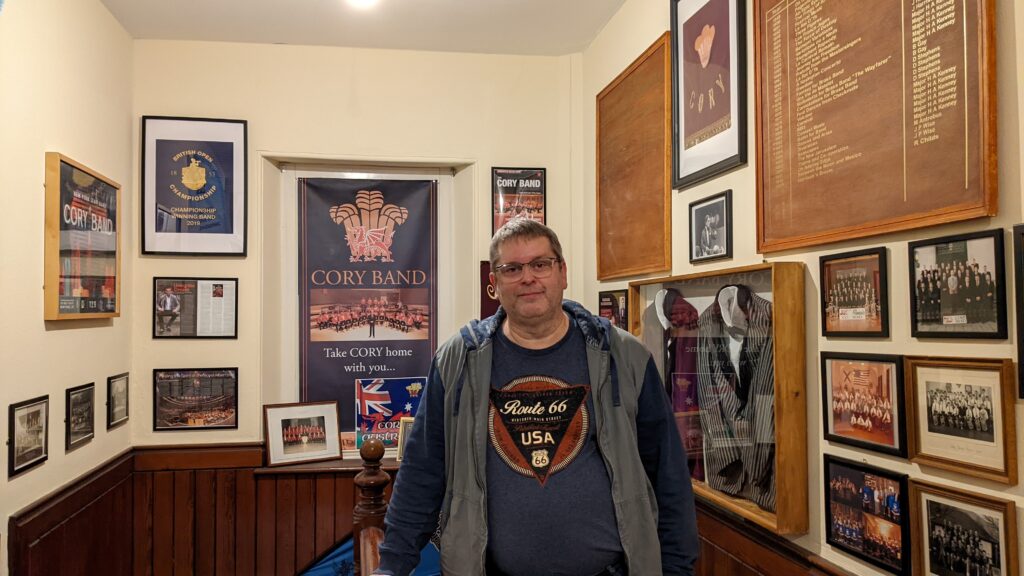
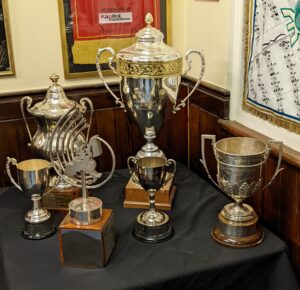
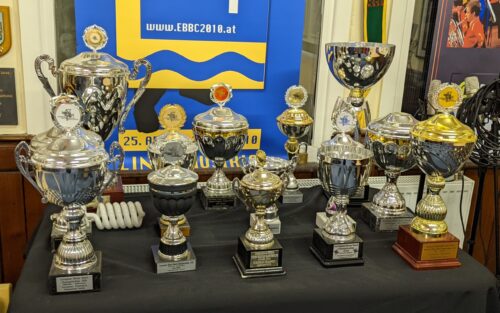
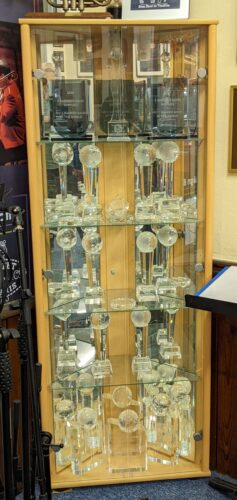
I’m guessing that the musicians reading this may be interested in knowing how rehearsal two went, after reading my earlier words on rehearsal one. It went better. Not great. But notably better. I still feel out of place and out of character and it’s a little as if I hear someone else’s playing coming out the bell of my horn. But it’s improving and occasionally I hear my usual self creeping in.
The cornet section has been playing a bit of musical chairs for these two rehearsals. The principal cornetist, Tom Hutchinson, was gone Monday night (performing in South Korea). Because of his absence, Hannah (rep) moved to principal, Owain (fourth man down) moved to Hannah’s chair, and Neil (band manager and excellent cornetist as well) took his place. Tom was back last night, so that all shifted back and there were other deps involved, making the whole cornet section a bit difficult to know who is actually in their regular chair. Tom is a brilliant player. I’ve known this for years, but it was a joy to listen to him play in person. He has a beautiful, smooth sound and technique to spare. There were a couple times in the rehearsal that I forgot to play my part or came in late because I was too busy enjoying listening to Tom. I probably shouldn’t admit that, but it seemed unavoidable at the time.
I guess that I need to explain some terms used here that we don’t hear at home: A dep (deputy) is a sub (substitute). The third man down or fourth man down is the third or fourth chair in the solo cornet section or the front row. A bumper-up or bumper-upper is the second solo cornet chair (the player to the left of the principal cornet). A sop is soprano cornet. Then there are the British names for note lengths (terms I haven’t heard since college): breve (whole note), minim (half), crotchet (quarter), quaver (8th), semiquaver (16th), demisemiquaver (32nd), and hemidemisemiquaver (64th). Yes, these are the actual terms.
The rehearsal started with the march, Carnival Day. It’s one of the marches I really like, so it was fun to play. It also gave me an opportunity to work on shortening those short notes. Elephant Patrol, an original by Philip for Cory Band’s The Jungle Book suite for Brass in Concert a couple years ago, came next. This is just a very fun piece both to play and to hear. Tom’s brilliant cornet playing was featured next on Glorious Ventures. These first three pieces can give the soprano player an undue sense that all is well, because the parts aren’t very difficult and they’re great fun to play. These are all amongst the pieces for the first concert.
Next came an old piece of music that the band will play at an upcoming event. I won’t say what it is in case I shouldn’t. It’s in three movements (medium tempo, slow, up tempo). The first movement is practically sight-readable, so really of no concern. The second movement is fairly short, but for some reason my brain decided to step out during this movement, so my body was left to fend (fent?) for itself without it. I did not play well. For one short exposed spot I got started on the wrong harmonic and it just went downhill from there. Yeah, sometimes that happens–the brain decides to go out for some air when you need it most. That was embarrassing, but it’s done now. The third movement was less eventful. This is a piece of music that everybody here has known for years. And it’s a piece I just don’t know at all. We’ve all been in that position before, but it should’ve gone a lot more gracefully than it did in that second movement.
Next up was the same piece that I had the little solo bits on the first rehearsal. It was better. But it still doesn’t feel or sound like me. I tried a couple things. I didn’t like them. I think Philip liked them even less. I’ll be less adventuresome next time and just stick to playing the notes with more of a singing quality and play less with the time. The problem for me with playing with a singing quality is that nobody should ever be forced to have to listen to me sing. So when I sing through the horn, I have to channel a singer whose voice I like. Bud Herseth (long time principal of the Chicago Symphony) always said that he listened to opera singer Jussi Björling in order to generate a beautiful singing tone. I guess maybe Josh Groban is more my style (definitely more Barbara’s style). I think for this rehearsal though, some sneaky part of the back of my mind was thinking Joe Cocker would be a good choice. Yeah, it was clearly wrong. I’ll work on it so that on Sunday it’s much closer to Josh than Joe.
We spent some time working on a couple sections of a large piece for an upcoming contest (that is literally months away, but this is the sort of music that you need to start working on as soon as you get your hands on it). Now I need to admit here that competition music is not my favorite. Maybe it stems from the fact that I just don’t think of myself as a competitive person. Playing with the world’s most winning band though, you do find yourself surrounded by people that love a good win. That doesn’t mean that I’ll approach the music any differently. I still expect to give it my best, no matter what the music’s purpose. Maybe I could learn to be more competitive. For soprano, this piece is not as difficult as many other contest pieces I’ve heard. Other than a handful of measures, the parts are really quite comfortable. The hardest thing in this piece is not playing the notes, but instead knowing when to play those notes as counting rests is actually more complicated than playing. We didn’t work through this whole piece–just some of the beginning and some of the end. But what it did include is one difficult measure for me that is a quasi-cadenza. Luckily for me though, my brain had safely arrived back where it belongs before we started this piece and this little cadenza went well. We played it twice. The first time was better. I missed a pitch on the second try, but it was clearly better than Joe Cocker’s non-helpful voice on the other piece. We played the ending of the piece a little down from the eventual tempo. Even at this lower speed it has its difficult moments, but my part is manageable. There’s just one two-measure spot with a little finger-twister that’s not yet up-to-snuff and as luck would have it, it’s rather exposed too. Yay. The entire last page of this piece is very fun to play and will be very exciting when up to performance speed.
The rehearsal ended with two of the fun and less serious pieces, one of which featured star (and very well deserved) euphonium player Glyn Williams. The other was Bobby Darin’s classic Beyond the Sea rescored by Philip from Bobby’s classic big band sound. It’s a favorite piece and a great way to end a rehearsal to help one feel good about things. And there is choreography. Yup. Choreography. Me. Really. It’s just some swaying and a couple flashy horn-up sorts of things. I like it.
It was one of the basses’ (tuba) last rehearsal – he’s waited several years for a suitable replacement to be found before leaving – so everyone headed out to a nearby football (soccer) club for a celebratory beverage. We continued being the odd Americans, not partaking in beverage. Even though he was zonked by jet lag (9 hours from South Korea), Tom (and Ailsa, the solo tenor horn player) were kind enough to join us, ask questions, and tell us about things to do in the area and about the band.
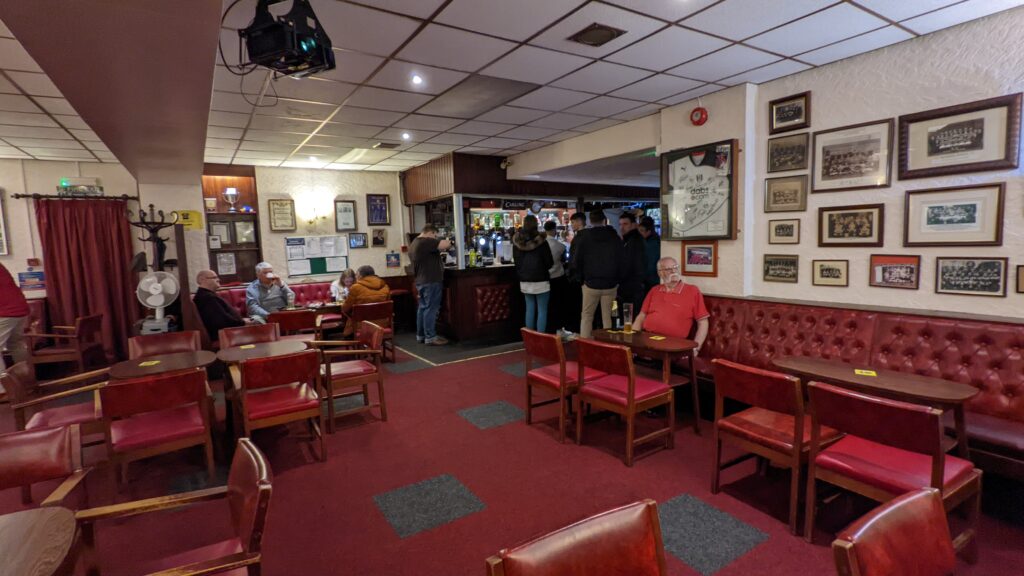
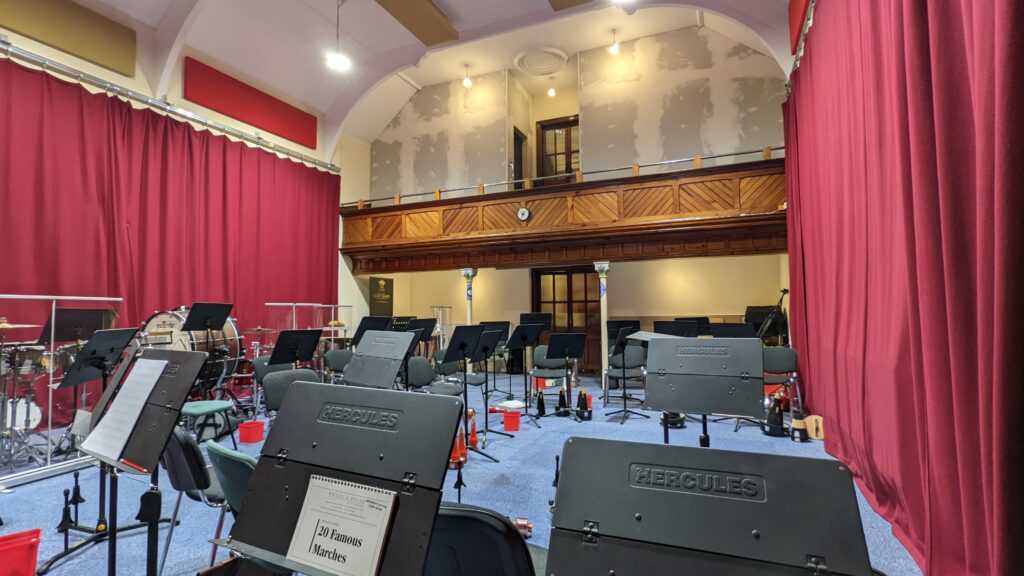
Glad to hear you’re getting your feet underneath you. I know it’ll only get better, especially as things become more routine.
Man, it would be tough for me rehearsing in such a tiny space – so much sound coming at you and so much to analyze. Definitely would take a lot of getting used to. Hang in there – you’ll be great!
Thanks, Keith, for this amazing description of a world I know nothing about. The pictures are gorgeous. Enjoy! Enjoy!
Love the story telling Keith. So glad you are able to live the dream. Please keep posting as I find your narrative very interesting.
I cannot imagine you having any problems on the horn or with the music. I know the concert will go great.
Good show – really nice to start getting a better feel for all of this, both the space and dynamics (so to speak). The concert will be fun, no doubt!